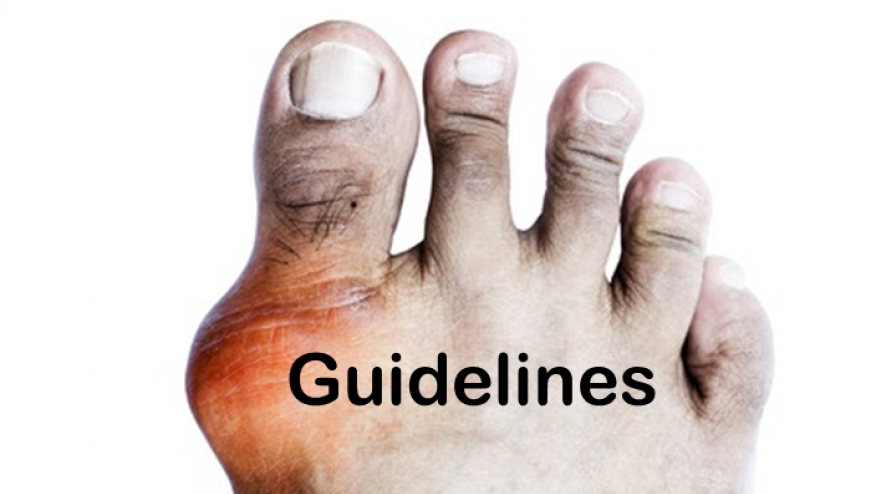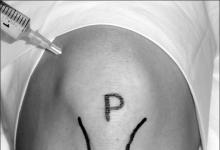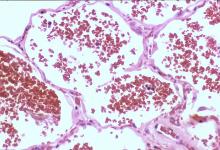New ACR Guidelines for Gout Management Save

The ACR has published the 2020 guidelines on the management of gout that includes strong recommendations favoring treat‐to‐target management and starting urate lowering therapy (ULT) for patients with frequent flares, radiographic damage or tophi due to gout.
The final guidance has 52 recommendations, including 16 strong recommendations resulting from the consideration and literature analysis of 57 PICO questions and GRADE assessment. The guidelines do not address the impact of gout or hyperuricemia on other comorbidities, such as cardiovascular disease (CVD), hypertension, urolithiasis, or chronic kidney disease (CKD).
The whole document can be read at the link provided at the end of this article. Below are experpted recommendations from the published guideline.
Urate Lowering Therapy (ULT)
- Initiating ULT is strongly recommended for gout patients with any of the following: ≥1 subcutaneous tophi; evidence of radiographic damage (any modality) attributable to gout; OR frequent gout flares, with frequent being defined as ≥2 annually.
- Initiating ULT is conditionally recommended for patients who have previously experienced >1 flare but have infrequent flares (<2/year).
- Initiating ULT is conditionally recommended against in patients with gout experiencing their first gout flare.
- However, initiating ULT is conditionally recommended for patients with experiencing their first flare when comorbid moderate‐to‐severe CKD (stage ≥3), SU concentration >9 mg/dl, or urolithiasis is present.
- Initiating ULT is conditionally recommended against in patients with asymptomatic hyperuricemia.
- Treatment with allopurinol as the preferred first‐line agent, over all other ULTs, is strongly recommended for all patients, including those with moderate‐to‐severe CKD (stage ≥3).
- The choice of either allopurinol or febuxostat over probenecid is strongly recommended for patients with moderate‐to‐severe CKD (stage ≥3).
- Starting treatment with low‐dose allopurinol (≤100 mg/day and lower in patients with CKD [stage ≥3]) and febuxostat (≤40 mg/day) with subsequent dose titration over starting at a higher dose is strongly recommended.
- Administering concomitant antiinflammatory prophylaxis therapy (e.g., colchicine, nonsteroidal antiinflammatory drugs [NSAIDs], prednisone/prednisolone) over no antiinflammatory prophylaxis therapy is strongly recommended.
- Continuing concomitant antiinflammatory prophylaxis therapy for 3–6 months over <3 months, with ongoing evaluation and continued prophylaxis as needed if the patient continues to experience gout flares, is strongly recommended.
- When the decision is made that ULT is indicated while the patient is experiencing a gout flare, starting ULT during the gout flare over starting ULT after the gout flare has resolved is conditionally recommended.
- A treat‐to‐target management strategy that includes ULT dose titration and subsequent dosing guided by serial SU measurements to achieve a target SU, over a fixed‐dose ULT strategy, is strongly recommended for all patients receiving ULT.
- Achieving and maintaining an SU target of <6 mg/dl over the use of no target is strongly recommended for all patients receiving ULT.
- Delivery of an augmented protocol of ULT dose management by nonphysician providers to optimize the treat‐to‐target strategy that includes patient education, shared decision‐making, and treat‐to‐target protocol is conditionally recommended for all patients receiving ULT.
- Testing for the HLA–B*5801 allele prior to starting allopurinol is conditionally recommended for patients of Southeast Asian descent (e.g., Han Chinese, Korean, Thai) and for African American patients, over not testing for the HLA–B*5801 allele. Universal testing for the HLA–B*5801 allele prior to starting allopurinol is conditionally recommended against in patients of other ethnic or racial background over testing for the HLA–B*5801 allele.
- Switching to an alternative oral ULT agent, if available and consistent with other recommendations in this guideline, is conditionally recommended for patients taking febuxostat with a history of CVD or a new CVD‐related event.
- Switching to pegloticase over continuing current ULT is strongly recommended for patients with gout for whom XOI treatment, uricosurics, and other interventions have failed to achieve the SU target, and who continue to have frequent gout flares (≥2 flares/year) OR who have nonresolving subcutaneous tophi.
- Switching to pegloticase over continuing current ULT is strongly recommended against for patients with gout for whom XOI treatment, uricosurics, and other interventions have failed to achieve the SU target, but who have infrequent gout flares (<2 flares/year) AND no tophi.
Gout Flare Management
- Using colchicine, NSAIDs, or glucocorticoids (oral, intraarticular, or intramuscular) as appropriate first‐line therapy for gout flares over IL‐1 inhibitors or adrenocorticotropic hormone (ACTH) is strongly recommended for patients experiencing a gout flare.
- Using an IL‐1 inhibitor over no therapy (beyond supportive/analgesic treatment) is conditionally recommended for patients experiencing a gout flare for whom the above antiinflammatory therapies are either ineffective, poorly tolerated, or contraindicated.
- Treatment with glucocorticoids (intramuscular, intravenous, or intraarticular) over IL‐1 inhibitors or ACTH is strongly recommended for patients who are unable to take oral medications.
Lifestyle Factors
- Limiting alcohol intake is conditionally recommended for patients with gout, regardless of disease activity.
- Limiting purine intake is conditionally recommended for patients with gout, regardless of disease activity.
- Limiting high‐fructose corn syrup intake is conditionally recommended for patients with gout, regardless of disease activity.
- Using a weight loss program (no specific program endorsed) is conditionally recommended for those patients with gout who are overweight/obese, regardless of disease activity.
- Adding vitamin C supplementation is conditionally recommended against for patients with gout, regardless of disease activity.
Concurrent Medications
- Switching hydrochlorothiazide to an alternate antihypertensive when feasible is conditionally recommended for patients with gout, regardless of disease activity.
- Choosing losartan preferentially as an antihypertensive agent when feasible is conditionally recommended for patients with gout, regardless of disease activity.
- Stopping low‐dose aspirin (for patients taking this medication for appropriate indications) is conditionally recommended against for patients with gout, regardless of disease activity.
- Adding or switching cholesterol‐lowering agents to fenofibrate is conditionally recommended against for patients with gout, regardless of disease activity.










If you are a health practitioner, you may Login/Register to comment.
Due to the nature of these comment forums, only health practitioners are allowed to comment at this time.